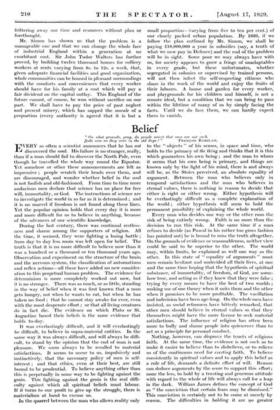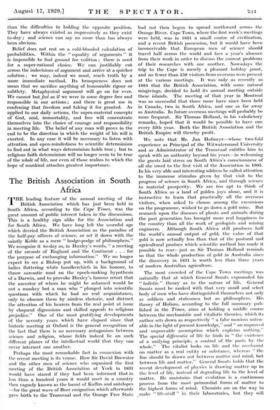Belief
people assert that men are not Ouch
old days?" FRAKOIS RABELAIS.
" On what grounds, pray, do
fools now as they were in the FVERY so often a scientist announces that he has not discovered the soul. His failure is no stranger, really, than if a man should fail to discover the North Pole, even though he travelled the whole way round the Equator. Yet somehow or other these announcements are felt as impressive ; people scratch their heads over them, and are discouraged, and wonder whether belief in the soul is not foolish and old-fashioned. From time to time more audacious. men declare that science has no place for free will, immortality, or God. The instructions of science are to investigate the world in so far as it is determined ; and it is no marvel if freedom is not found along these lines. Yet the popular opinion holds that every day it is more and more difficult for us to believe in anything, because of the advances of our scientific knowledge.
During the last century, there was continual restless- ness and shame among the supporters of religion. All the time, it seemed, they were fighting a losing battle ; from day to day less room was left open for belief. The truth is that it is no more difficult to believe now than it was a hundred or a thousand or ten thousand years ago. Observation and experiment on the structure of the brain and the nervous system, the classification of automatisms and reflex actions—all these have added no new consider- ation to this perpetual human problem. The evidence for determinism is more completely worked out now, but it is no stronger. There was as much, or as little, standing in the way of belief when it was first known that a man gets hungry, not when he wants to eat, but when he has taken no food ; that he cannot stay awake for ever, even with the most desperate effort ; or that all living creatures do in fact die. The evidence on which Plato or St. Augustine based their beliefs is the same evidence that holds to-day.
It was everlastingly difficult, and it will everlastingly be difficult, to believe in supra-material entities. In the same way it was always difficult, and will always be diffi- cult, to stand by the opinion that the end of man is not pleasure. We seem always to be recalled to material satisfactions. It seems to occur to us, impulsively and instinctively, that the necessary policy of men is self- interest ; and that ethics, even at their best, are still bound to be prudential. To believe anything other than this is perpetually in sonic way to be fighting against the grain. This fighting against the grain is the real diffi- culty against which all spiritual beliefs must labour. If it turns to our profit to give up the struggle; there is materialism at hand to excuse us.
In the quarrel between the man who allows reality only to the " objects " of his senses, in space and time, who holds to the primacy of the thing and thinks that it is this which guarantees his own being ; and the man to whom it seems that his own being is primary, and things are known only by the light of his mind, there is and always will be, as the Stoics perceived, an absolute equality of argument. Between the man who believes only in temporal satisfactions and the man who believes in eternal values, there is nothing in reason to decide that either is right or either wrong. Either hypothesis will be everlastingly difficult as a complete explanation of the world ; either hypothesis will seem to hold the permanent possibility of explaining the whole world.
Every man who decides one way or the other runs the risk of being entirely wrong. Faith is no more than the decision to run this risk. At the same time if a man refuses to decide (as Pascal in his rather too gross fashion has pointed out) he is bound to miss the truth altogether. On the grounds of evidence or reasonableness, neither view could be said to be superior to the other. The world may, within limits, be explained as well one way as the other. In this state of " equality of arguments " most men remain hesitant and undecided all their lives, at one and the same time hoping that the hypothesis of spiritual substance, of immortality, of freedom, of God, are some- how true, and acting as if they knew that they were false ; trying by every means to have the best of two worlds ; making use of one theory when it suits them and the other when it promises to be more profitable. The vacillation and indecision have been age-long. On the whole men have insisted, as social reformers have bitterly remarked, that other men should believe in eternal values so that they themselves might have the more license to seek material' satisfactions. The influence of religion has often been more to bully and shame people into quiescence than to act as a principle for personal conduct.
Nothing, however, can disprove the tenets of religious faith. At the same time, the evidence is not such as to make it easier to believe than to disbelieve, or to relieve us of the continuous need for exerting faith. To believe consistently in spiritual values and to apply this belief as a rule of life, demands a definite effort of will. Reason can deduce arguments by the score to support this effort; none the less, to hold by a trusting and generous attitude with regard to the whole of life will always call for a leap in the dark. William James defines the concept of GOd as " the conviction that certain fears may be dismissed.! This conviction is certainly not to be come at merely by reason. The difficulties in holding it are no greater than the difficulties in holding the opposite position. They have always existed as impressively as they exist to-day ; and science can say no more than has always been obvious.
Belief does not rest on a cold-blooded calculation of probabilities. Within the " equality of arguments " it is impossible to find ground for volition ; there is need for a super-rational choice. We can justifiably cut across the indecisions of argument and arrive at a quicker solution ; we may, indeed we must, reach truth by a more immediate method. Its brusqueness does not mean that we sacrifice anything of honourable rigour or subtlety. Metaphysical argument will go on for ever. We cannot but feel as if we were in some degree free and responsible in our actions ; and there is great use in confessing that freedom and taking it for granted. As applied to our daily actions, the supra-material concepts of God, soul, immortality, and free will concentrate themselves into the choice of courage and responsibility in meeting life. The belief of any man will prove in the end to be the direction in which the weight of his will is exerted. In any case it will be necessary to listen with attention and open-mindedness to scientific determinism to find out in what ways determinism holds true ; but to religious faith determinism will no longer seem to be true of the whole of life, nor even of those realms to which the hope of mankind attaches greatest importance.

































 Previous page
Previous page